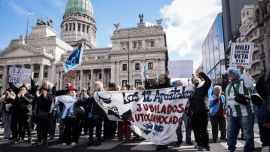Brazil reached six million coronavirus infections amid growing signs the spread is accelerating in what was already one of the world’s hardest-hit nations.
São Paulo, one of the early hotspots, is of particular concern as data show hospitalisations on the rise, threatening to stretch the health system to its limits. Nationwide, the daily infections have jumped 25 percent in the past two weeks as testing picked up, according to the country’s association of diagnostic medicine.
“The data of the last week was worrying,” said Marcelo Gomes, who oversees a bulletin on respiratory diseases published by the Oswaldo Cruz Foundation, one of Latin America’s most prominent health and science institutes. “We had been seeing an uptick in capitals in the north and northeast mostly, but now there are signs capitals in other regions may also be seeing a pickup.
“There’s no doubt” there’s a risk of a second wave as the virus continues to circulate, he added. Gomes cited Belo Horizonte and Brasilia, in the centre of the country, as potential causes for concern, as well as Curitiba and Porto Alegre in the south, where the downward trend in cases seems to have stopped.
Brazil, which has the world’s second-most deaths and third-most cases of coronavirus, was among the last places to get hit by the first wave of the pandemic that originated in China. Now, as Europe and the US battle another surge of infections, concerns are growing that South America’s largest country could once again be overrun by Covid-19.
On Friday, Brazil added 38,397 cases, pushing the total number of infections to 6,020,164, trailing only the United States and India globally. It ranks second in the world in total deaths from the virus, with 168,613 fatalities. In deaths per 100,000, Brazil comes in fifth, behind Mexico, Spain, Argentina and the United Kingdom, according to data from Johns Hopkins.
Health experts say the accelerating infections follow an increase in public events and gatherings as social distancing measures ease. Large in-person events from college entry exams to football matches have largely resumed. In major cities including São Paulo and Rio de Janeiro, parks and beaches are filling up with fewer masks in sight each week.
Even an oil platform operated by state-run Petroleo Brasileiro SA is having an outbreak, with 28 out of 140 workers testing positive, according to union Sindipetro Litoral Paulista.
Pandemic fatigue
In São Paulo, Brazil’s biggest state and the one that has borne the brunt of the pandemic, the moving average of new infections has jumped to the highest since early October. While still well below peak levels, hospitalisations have risen eight percent in the past week. The main culprit seems to be parties and gatherings of younger people, according to Health Secretary Jean Gorinchteyn.
“We see a certain fatigue in regard to the pandemic,” he said in a press conference Thursday. “It’s a time for attention and caution.”
The nation of 210 million, which had its first confirmed case of the novel coronavirus in late February, has seen consistently high numbers as the disease that started in rich cities then spread to rural areas spared earlier in the pandemic. Regional differences made it harder to pinpoint when the virus would peak – an already complicated task in a country where some states are the size of France and where many live in poverty and can’t afford not to work.
The pandemic has also become a political battleground, with President Jair Bolsonaro’s government repeatedly playing down the severity of the disease and dismissing the benefits of lockdowns.
The new wave of cases comes after the pace of new infections had slowed since mid-August. Brazil had been adding a million positive tests a month since breaching the one million mark in mid-June. The last milestone, five million, was hit October 7.
“The first wave never ended,” said Wildo Navegantes, an epidemiologist and professor of public health at the University of Brasilia. “What we have is a tsunami that continues to take away lives.”
by Caroline Aragaki, Simone Iglesias & Marisa Wanzeller, Bloomberg





















Comments